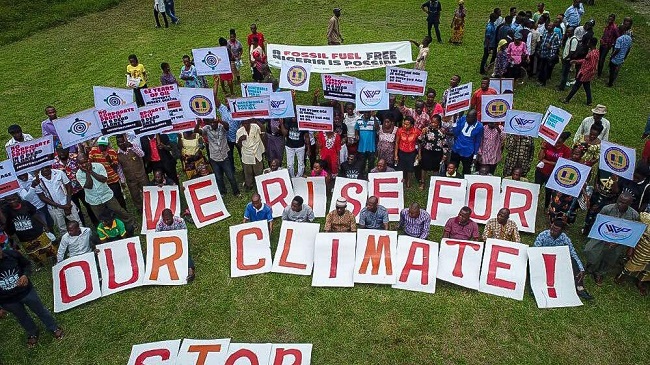A powerful wave of global actions is set to take place this September as movements across the world unite in historic global days of action. Under the banner Draw the Line, communities will mobilise in towns and cities to draw the line against injustice, pollution, and violence, and for a just transition and a future built on renewable energy, fairness, and peace.

The call has become a global rallying cry supported by workers, youth, indigenous groups, and social movements. In a world marked by escalating climate disasters, rising authoritarianism, and deepening inequality, the message is clear: we must draw the line for people and the planet.
Draw the Line is a global action (September 15 to 28) with widespread mobilisations large and small peaking over the weekend of September 19 to 21, 2025. The call to action to Draw the Line: Rights, Jobs and Justice, is being co-convened by a network of global climate organisations 350.org, CAN-International, APMDD and War on Want, together with other local, regional and global movements across the world.
This announcement comes at the same time as a major climate address by the UN Secretary-General António Guterres in New York, where he declared the shift to renewable energy is already happening and emphasised the economic, social, and security benefits of a just transition away from fossil fuels.
Participants in Draw the Line are planning thousands of actions across continents, from red and green lines to long marches, strikes, festivals, community gatherings, and cultural events. Mass “line” formations, symbolic boundary markings, and bold artistic interventions will demand just transitions, climate finance for the Global South and fossil fuel phase-outs, among other demands.
Hundreds of events are to take place, including mobilisations in Johannesburg, New Delhi, Mumbai, Kolkata, Karachi, Lahore, Nairobi, Cotonou, Ottawa, New York City, London, Paris, Berlin, Suva, Melbourne, Jakarta, Manila, Tokyo, Dhaka, and Belem.
The September mobilisation comes just six weeks before world leaders gather in Brazil for COP30. Movements will call for a better world for ourselves, our children and our communities.
“A world with renewable, affordable energy for everyone. A world where we can speak up for our rights, where people and nature are safe, and where big polluters help pay to fix the climate crisis.
“Our future belongs to us, not to polluters and billionaires. This is our line to draw.”
The demands include:
Change the system through an equitable and just transition:
We demand climate action to centre workers and communities, a Just Transition requires putting people’s needs and voices front and centre on decision-making. Climate action should deliver dignity for working people and everyone hurt by the climate crisis and the unfair systems behind it. A global just transition needs to help every country thrive without harming our planet.
Power Up Renewables, Shut Down Polluters:
- No new fossil fuel projects. No new projects, finance – public or private – subsidies and no new approvals, licences, permits, or extensions.
- A rapid, fair, and equitable orderly phase out of decline in fossil fuel production in line with the 1.5C temperature limit must start now, with a global plan, like a Fossil Fuel Non-Proliferation Treaty, in order to ensure that each country does its fair part with rich countries moving first and fastest.
- Triple renewables by 2030 and make them socially owned, affordable, distributed and led by communities.
- Justice and human rights must be at the heart of the energy transition. End colonial practices in renewable expansion.
Fund the Future, not the Crisis:
- Tax their billions, break the fossil fuel and agribusiness oligarchies, make polluters pay: back national and global wealth taxes on the super-rich and a permanent increase of taxes on fossil fuel corporations. Economic and political power must be redistributed to serve people and the planet through progressive tax systems.
- Climate finance is a right, not charity. It’s part of the reparations for a historic debt owed by the Global North for centuries of extraction and exploitation: we demand a real roadmap to get to the trillions not billions, with grants – not loans – to fund real solutions in the Global South. People living in harmony with nature must receive direct funding for their essential ancient knowledge in preserving biodiversity and climate justice, with fair, transparent, and immediate compensation for the harm they suffer.
- Cancel illegitimate debts, end austerity so communities can build thriving futures. Public money must fund investments in green jobs, renewables for all, affordable housing, health and education services, public transport and locally rooted just transitions.
- Divest from war to invest in social and climate justice. This means divesting from major arms companies and the asset managers and insurers (Big Finance) that supports and sustains them, and cutting global military spending – at least 10% of national military budgets – to redirect the funds to strengthen initiatives that prevent rather than perpetuate and profit from conflict and climate change (such as climate finance, social welfare, civil society, peacebuilding, gender equity).
Reclaim Democracy:
- Protect people, not polluters.
- Kick fossil fuel companies and their lobbyists out of politics. Decisions about our future should be made by people and communities, especially those most affected by climate change – not big companies. Indigenous peoples, who help protect the Earth, and frontline communities must have a real say in climate talks.
- Climate action should provide dignity to workers, and everyone hurt by the climate crisis and the unfair system behind it. A fair global energy transition should help every country thrive without harming our planet.
Build Peace:
- End war, violent conflict, and genocide.
- Defend Human Rights, Freedom, and Peace.
- Protect the right to protest, organise, and speak out.
Restore Our Relationship with the Earth:
- Stop large-scale industrial farming. It makes climate change worse, drives deforestation, relies on burning fossil fuels and violates human rights. Instead, switch to fair agriculture that protects nature, respects land rights, and gives communities control over their own food.
